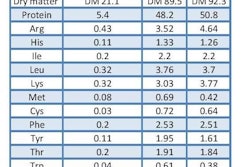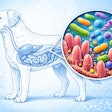A meta-analysis was conducted to understand the quantitative aspects of calcium (Ca) and phosphorus (P) absorption in adult dogs and cats. Thirty-four studies in dogs and 14 studies in cats met the criteria for inclusion in the meta-analysis.
Intake and fecal excretion values of Ca and P were subjected to a modified Lucas test and subsequent regression analyses. According to the current scientific consensus, Ca true digestibility (absorption) should increase at low Ca intake and decrease at high Ca intake. If true, this should result in a nonlinear relationship between the percentage of Ca excreted and dietary Ca intake. The present meta-analysis showed a highly significant linear relationship between Ca intake and Ca excretion, suggesting a lack of systematic quantitative adaptation in true Ca digestibility. This finding suggests either that the time period covered by standard digestion trials is too short to induce adaptation mechanisms or that dogs and cats at maintenance will not efficiently alter quantitative Ca absorption percentage according to the amount ingested. If the latter is true, a dietary Ca supply differing greatly from the recommended dietary intake might impair the health of cats and dogs when fed long term.
The data plots for P intake and fecal excretion were less uniform, suggesting other factors—not just dietary intake—influence fecal P excretion. In adult cats, the dietary Ca:P ratio strongly influenced the true digestibility of P, whereas this effect was less marked in adult dogs, according to the meta-analysis. Fecal P excretion was significantly correlated to fecal Ca excretion in both species, and the level of P intake did not appear to be an important determinant of true digestibility of P.
Source: J.K. Mack et al., 2015. Demonstration of uniformity of calcium absorption in adult dogs and cats. JAPAN online, March 2015. doi: 10.1111/jpn.12294

















